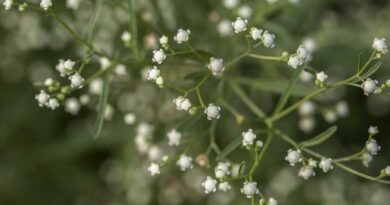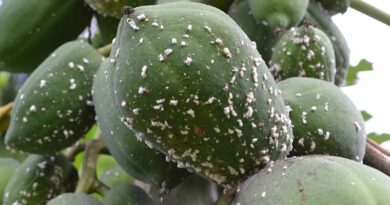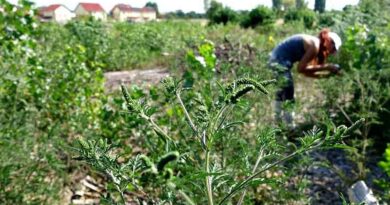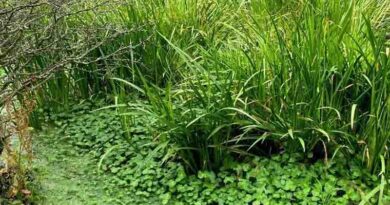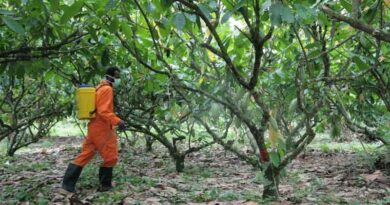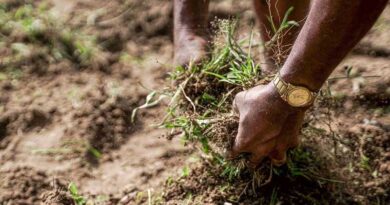Biocontrol agent released to control noxious parthenium weed in Pakistan
23 June 2023, Pakistan: A “major step forward in the fight against noxious parthenium weed” in Pakistan has been taken with the release of a biological control agent at the National Agricultural Research Centre (NARC) in Islamabad.
The move is seen as a significant measure to help combat the risks parthenium poses to human and animal health, biodiversity and food security in Pakistan.
One of Pakistan’s most troublesome invasive species
According to the CABI Evidence Note ‘Parthenium: Impacts and coping strategies in Central West Asia’, parthenium can cause severe allergic reactions in humans and livestock, may harbour malaria-carrying mosquitoes and displace native plant species.
The plant – which is considered one of Pakistan’s most troublesome invasive species – can also reduce pasture carrying capacities by as much as 80% to 90% where in India, for example, the cost of restoring grazing land is around USD $6.7 billion per annum.
Stem boring weevils released
Five hundred stem boring weevils (Listronotus steosipennis) were released to serve as a more sustainable approach to managing parthenium which is also known as ‘famine weed’ due to its impacts on food security.
In attendance at a special release ceremony at the NARC premises were Dr Ghulam Muhammad Ali, Chairman of the Pakistan Agricultural Research Council (PARC), Dr Babar Bajwa, CABI’s Senior Regional Director, Asia, and a delegation of journalists from various media outlets.
The stem boring weevil was approved for release in 2021 after host range testing took place in Pakistan to determine its safe usage as a biological control agent to literally ‘nip parthenium in the bud.’
Busy implementing biocontrol measures
CABI’s centre in Pakistan, through the PlantwisePlus programme, is busy implementing biocontrol measures which are safer-to-use and more environmentally friendly. It carried out further tests that agreed with the earlier findings that the stem boring weevil is safe to use.
Dr Ghulam Muhammad Ali, said, “The release of the stem boring weevil is a major step forward in the fight against noxious parthenium weed in Pakistan which poses a major risk to human and animal health, biodiversity and food security.
“This breakthrough has been made possible through collaboration between CABI, PARC, NARC, universities in Faisalabad, Swabi and Mardan as well as integration with the PlantwisePlus programme.”
Parthenium is native to tropical America and was accidentally introduced into several countries. In Pakistan it now covers thousands of hectares of productive and rangeland, posing a huge economic burden.
CABI conducted host range testing
Dr Bajwa said, “Parthenium’s success as an invasive species can be attributed to its wide adaptability, drought tolerance, high seed production, longevity of seeds in soil seed banks and lack of natural enemies in non-native regions.
“At CABI’s quarantine facility in Rawalpindi it was important, prior to release, to conduct host range testing on several species and varieties of important native and crop plants to ensure the weevil did not pose a risk to indigenous fauna.”
The stem boring weevil controls parthenium by laying its eggs primarily in the flowers where newly hatched larvae tunnel into the stem and continue to feed, eventually exiting at the base of the stem to pupate in the soil.
More sustainable way to manage parthenium spread
Several larvae feeding in the stem can kill parthenium rosettes and mature plants. In Australia, the weevils were found to provide additional control of parthenium particularly in drought areas, where other biocontrol agents struggled to survive.
It is hoped that the introduction of this weevil will help manage the spread of parthenium in a more sustainable way without the need of chemicals or machinery that can have a negative impact on the environment.
Also Read: Corteva Agriscience launches new herbicide Novlect™ to control weeds in rice fields
(For Latest Agriculture News & Updates, follow Krishak Jagat on Google News)


